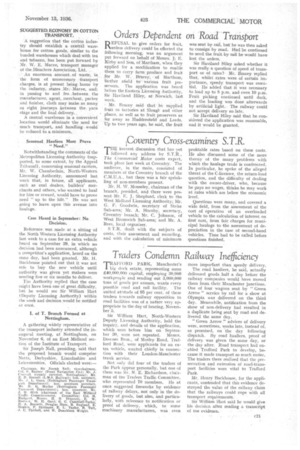Traders Condemn Railway Inefficiency
Page 75

If you've noticed an error in this article please click here to report it so we can fix it.
TRAFFORD PARR, Manchester's I big dock estate, representing some £40,000,009 capital', employing 30,000 workpeople and sending out 3,000,000 tons of goods per annum, wants every possible road and rail facility. The united attitude of 95 per cent. of these traders towards railway opposition to road facilities was of a nature very a.ppropriate to the day of hearing. November 5, Sir William Hart, North-Western Deputy Licensing Authority, held the inquiry, and details of the application, which were before him on September 30, were not repeated. Messrs. Downes Bros., of Mosley Road, Trafford Road, were applicants for an extra vehicle, wanted chiefly in connection with their London-Manchester trunk service.
Not only did four of the traders of the Park appear personally, but one of them was Mr. N. E. Richardson, chairman of the Traders Traffic. Committee, who represented 70 members. He at once suggested fireworks by evidence. of -railway delays, not only in the delivery of goods, but also and particularly, with reference to notification or proof of delivery, which, to Some machinery manufacturers, was even
more imporfant than speedy delivery.
The road hauliers, he said, actually delivered goods half a day before the railway companies would have moved them from their Manchester junctions. One of four wagons sent by "Green Arrow" service by rail for a show at Olympia was delivered on the third day. Meanwhile, notification from the show of non-delivery had resulted in a duplicate being eent by road and delivered the same day.
"Green Arrow ." advices of delivery were, sometimes, weeks late, instead of, as. promised, on the day following dispatch. By road hauliers, proof of delivery was given the same day, or the day after. Road transport had enabled Trafford Park to develop, because it made transport so much easier. Thetraders there realized that the preservation and extension of road-transport facilities were vital to Trafford Park.
Mr. Henry Barkhouse, for the applicants, contended that this evidence destroyed the value of the railway claim that the railways could cope with all transport requirements.
Sir William Hart said he would give his decision after reading a transcript of rise evidence.








































































































































































